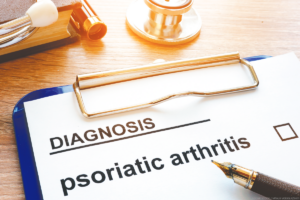 BALTIMORE—Approximately 30% of patients with psoriasis are estimated to be affected by psoriatic arthritis (PsA).1 Why do some patients develop PsA while others don’t? A session at the 19th Annual Johns Hopkins Advances in the Diagnosis and Treatment of Rheumatic Diseases Symposium titled Psoriatic Arthritis: Scientific Principles and Therapeutic Landscapes provided a wide array of insights into this question and a host of others.
BALTIMORE—Approximately 30% of patients with psoriasis are estimated to be affected by psoriatic arthritis (PsA).1 Why do some patients develop PsA while others don’t? A session at the 19th Annual Johns Hopkins Advances in the Diagnosis and Treatment of Rheumatic Diseases Symposium titled Psoriatic Arthritis: Scientific Principles and Therapeutic Landscapes provided a wide array of insights into this question and a host of others.
Pathology
The lecture was presented by Christopher Ritchlin, MD, MPH, professor of medicine, Center for Musculoskeletal Research, Allergy, Immunology and Rheumatology Division, University of Rochester, N.Y.
Dr. Ritchlin discussed work from Ogdie et al., which demonstrated that most patients with PsA have more than one domain involved. In many patients, the disease will manifest in myriad ways, including with peripheral arthritis, skin psoriasis, nail psoriasis, axial disease, enthesitis and dactylitis. Using data from patients enrolled in the Corrona PsA/Spondyloarthritis Registry, researchers found about 27% of patients have two domains of disease, 22% have three domains and 11% have four domains.2 These findings are important because success in treating PsA relies on identifying how the disease affects a specific patient. Patient care also requires understanding the effect treatment strategies may have on the domain(s) of disease in question.

Dr. Ritchlin
Before evaluating the clinical manifestations of PsA, we should seek to understand its pathobiology, noted Dr. Ritchlin. Recently in Nature Reviews Immunology, Kingston H. G. Mills, professor of Experimental Immunology, Biochemistry at Trinity College, Dublin, and director of the Trinity Biomedical Sciences Institute, provided an elegant explanation of the role of interleukin (IL) 17 and cells that produce IL-17 in both protection and pathology in people. IL-1ß and IL-23 induce production of IL-17A and IL-17F, which provide protective immunity against bacteria and fungi by promoting neutrophil recruitment, enhancing barrier function and producing antimicrobial peptides.3 When dysregulation of the IL-17 system occurs, immunopathology may result in chronic inflammation and autoimmunity. Thus, it’s logical that monoclonal antibodies directed against IL-17, IL-17A, IL-17F, the IL-17 receptor and IL-23 may be effective to treat patients with PsA.
Microbiome: The microbiome has received a fair amount of attention in the world of autoimmunity, and PsA is no exception. The recognition that psoriasis, PsA and inflammatory bowel disease frequently co-occur lends credence to the theory that intestinal health is involved in the development of all these diseases.
Theories for the role of the gut microbiome in the pathogenesis of psoriasis and PsA include issues related to altered immune homeostasis, intestinal permeability and imbalance of short- and medium-chain fatty acid-producing bacteria.4 Dr. Ritchlin summarized a few ways in which it would be possible to effectively alter the gut microbiome, including via fecal transplant, nutraceuticals, anti-inflammatory diets, pre- and pro-biotics, and bacteria and fungi that release anti-inflammatory compounds.



